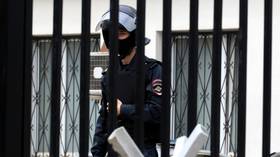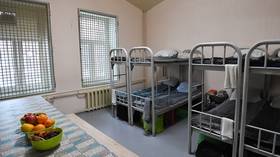Russia could tighten laws after prison torture scandal

Lawmakers in Russia’s parliament have proposed a bill that would send penitentiary officials convicted of torture to jail, following revelations of horrific abuse being inflicted on inmates in the Saratov region.
Andrey Klishas and Pavel Krasheninnikov, members of the governing United Russia party, submitted a draft of the legislation to the Duma, the lower house of parliament, on Monday. “The facts that have come to light about the cruel torture used on inmates in the Federal Penitentiary Service have raised widespread public concern, and cannot go without attention from lawmakers,” Krasheninnikov commented.
The draft includes a detailed definition of torture in accordance with the UN’s 1984 “Convention against Torture and Other Cruel, Inhuman or Degrading Treatment or Punishment.” This definition includes abuse committed with the stated goal of intimidating subjects so as to more easily control them.
The bill specifies that verbal abuse, humiliation, and the violation of basic human rights cannot be justified as serving any useful or good purpose. “A more detailed definition of ‘torture’ introduces specificity into the qualification of an action, and allows for suitable punishment of those found guilty,” Krasheninnikov said.
The proposed legislation would amend the Russian criminal code to allow for workers in the Federal Penitentiary Service to be prosecuted on torture charges. Previously, only interrogators or other types of investigators were liable. In addition to expanding the types of state employees who can be found responsible for torture, the bill would also increase punishment for the offense to a maximum of 12 years in prison.
The lawmakers’ move comes after footage was leaked in October showing groups of officials at several correctional facilities in Saratov, in southwestern Russia, torturing and raping prisoners. Vladimir Osechkin, the leader of Gulagu.net, the group that released the clips, said that this was just one example of widespread mistreatment taking place across the country, and that more examples would be published.
Following the scandal, Alexander Kalashnikov, director of the Federal Prison Service, fired four officers, including the head of the Saratov prison hospital, where some of the worst abuses were documented. Kalashnikov himself was later removed from office by President Vladimir Putin.
Last week, Russia’s Constitutional Court rejected a complaint by civil liberties activists who accused officials in detention facilities of interfering with their attempts to talk with detainees about abuse they had suffered. The court ruled that guards were within their rights to ban the conversations, because existing law prohibits discussions “with no relation to the custodial conditions” in the facilities, restricting investigation into mistreatment elsewhere in the system.
Human rights lawyer Grigory Vaypan told newspaper Kommersant that he was “bewildered” by the verdict and that he planned to appeal to other authorities to have the decision changed.















